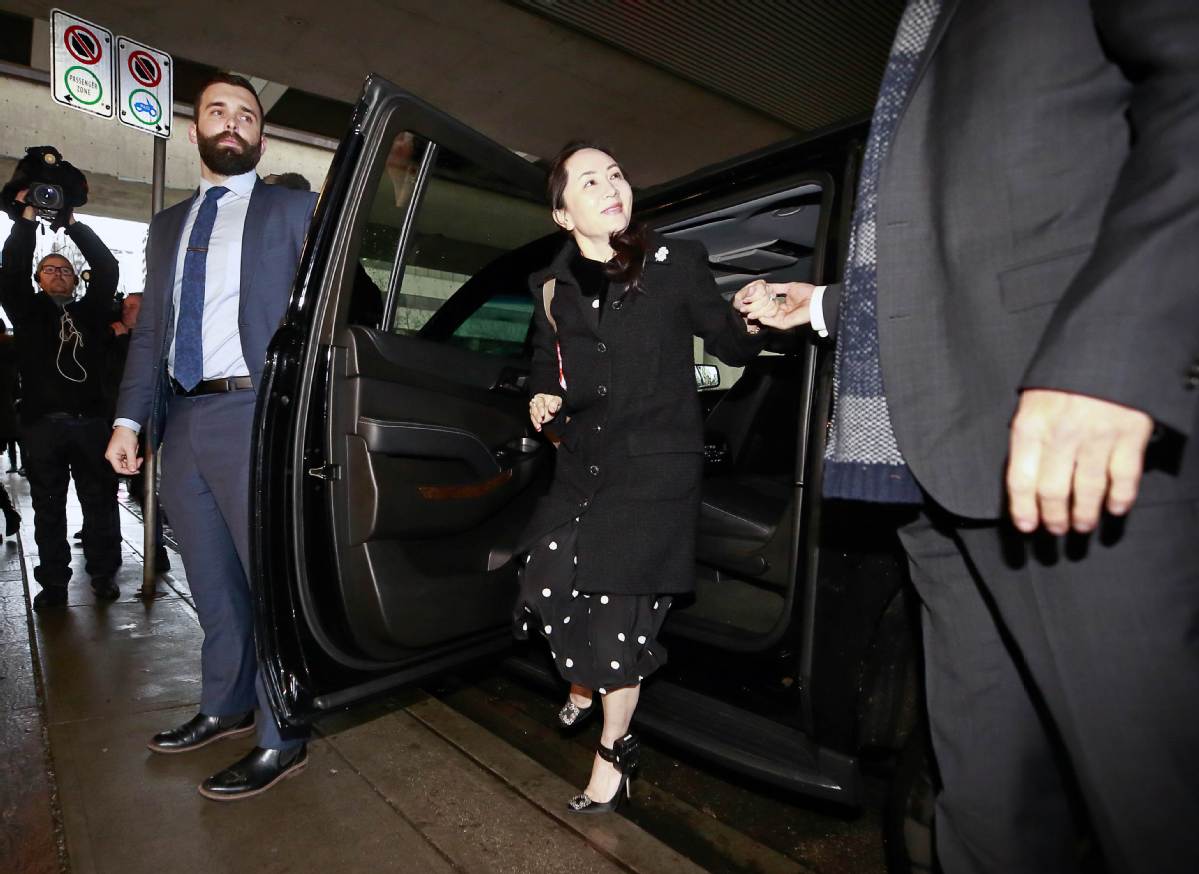Canadian law central to Huawei CFO case


The extradition hearing of Huawei Chief Financial Officer Meng Wanzhou will hinge on the legal issue of double criminality, meaning the United States' allegations could be dismissed if they are not considered a crime in Canada, but if they are, she could be extradited to the US, according to experts.
The formal phase of Meng's extradition hearing started on Monday at British Columbia Supreme Court. The fraud charges Meng faces from US prosecutors involve Huawei Technologies Co allegedly using a subsidiary to sell telecom equipment in Iran despite US sanctions against the Middle Eastern country.
Meng was arrested at Vancouver International Airport on Dec 1,2018, at the behest of US authorities.
Her defense team and lawyers for Canada's attorney general will debate the double criminality question before Associate Chief Justice Heather Holmes.
Meng's legal team, led by veteran lawyer Richard Peck, has argued that she should not be extradited because the charges, such as engaging in fraud to evade US sanctions on Iran, could not be considered crimes under Canadian law, and that it is not illegal in Canada to do business with Iran, because Canada lifted its sanctions against Iran four years ago.
Yves Tiberghien, a professor of political science at the University of British Columbia, said that in any case, it will be a long time from the proceedings to any extradition, if it happens at all.
"If the judge finds no dual criminality conditions, it could end the trial. If there is dual criminality found by the judge, then the trial will proceed but will take a long time, two years, maybe," Tiberghien told China Daily.
"After that, there could be an appeal to the Court of Final Appeals, then to the Supreme Court, then a decision of the minister (of justice) and another possible appeal," he said.
Strain on relations
Tiberghien said it is not certain that the US wants Meng to be tried in the US, as it would be a strain on already fraught US-China relations.
"Nonetheless, the arrest of Meng took China by surprise and has generated great public anger in China. Meanwhile, the arrest of two Michaels (businessman Michael Spavor and former Canadian diplomat Michael Kovrig on espionage charges) has generated anger in Canada. Relations are greatly suffering from the overall process," he said.
Meng's arrest has exacerbated ongoing diplomatic tension between Canada and China and drawn worldwide attention to Canada's extradition laws and precedents.
On the issue of whether Canada's minister of justice should intervene in Meng's case when all legal avenues have been exhausted, Tiberghien referred to Article 23-3 of the Canadian Extradition Act, which allows the minister to intervene.
But he pointed out that the provision in the law is rarely if ever used in Canada, as Canadians "frown upon" political interference in legal processes.
"It would require a good rationale rooted in the rule of law and the national interest. In common law countries like Canada, practice does have weight in addition to the law. So the political obstacles to intervening in the process are high," he said.
When US President Donald Trump said on social media that Meng's arrest and the trade war were linked "the Canadian government and the public were really astonished and shocked", he said. "It is understandable that Chinese people have paid strong attention to the tweet by the president. This has indeed given a political connotation to the case."
Eddie Goldenberg, a former chief of staff to former prime minister Jean Chretien and a current partner in the law firm of Bennett Jones LLP, pointed out that "it has been clear from the start that the Trump administration considers the matter to be in the realm of geopolitics".
Canadian lawyer Ping Tan said: "The impact of Meng's case on Canada-China relations has been widely commented on, and no doubt a decision against her will cause crippling damage to the already strained relations. It will be a lose-lose scenario."
Hours before the extradition hearing on Monday, China's Foreign Ministry once again called on Canadian authorities to immediately free Meng, daughter of Ren Zhengfei, the founder of the Shenzhen-based telecommunications giant, which is a leader in 5G wireless technology.
Huawei issued a statement on Monday that said: "We trust in Canada's judiciary system, which will prove Ms Meng's innocence. Huawei stands with Ms Meng in her pursuit of justice and freedom."




































